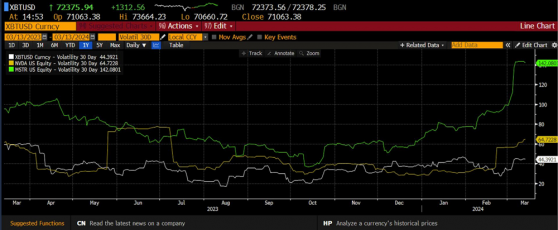Proactive Investors - The surge in NVIDIA Corp (NASDAQ:NVDA shares on the back of excitement around artificial intelligence (AI) has made it a move volatile investment than Bitcoin.
Generally, heavyweights of the S&P 500 would be expected to offer more stately progress than flighty small caps or highly unpredictable cryptocurrency.
Indeed, the volatility level of the as a whole index is low, and with Nvidia's valuation now topping US$2 trillion, making it the third-largest company on Wall Street, it might normally thought to be one of the most stable.
But with the share having more than tripled over the past year and almost quadrupled, it is still one of the most volatile stocks on the index.
"While the overall volatility level for the S&P 500 is low, there are pockets of extreme volatility," says Kathleen Brooks, research director at XTB, including Nvidia as the top-performing stock on the index.
"It has higher levels of short-term volatility than bitcoin," she says.
Overall a lack of volatility across the main indices has been one of the main features of financial markets this year, Brooks notes, with the Vix volatility gauge at subdued levels since November.
The Vix , known as Wall Street’s 'fear gauge', is currently at 13.8, below the average level for the last year of 15.5.
Nvidia’s individual volatility index is soaring, Brooks says, with the implied 30-day volatility for the chipmaker, derived from the options market, currently at 65, the highest level since July 2023.
Big price swings, massive growth prospects
"The reason for the extreme levels of volatility in Nvidia can be explained by looking at the price swings in the stock price in the last month," Brooks says.
The low for the stock was $667.66 on 21 February, with a high of $974 on 8 March.
"A range of $305 in a stock price in just a few weeks is extremely rare, it is even rarer for a stock on the S&P 500, which usually trade with far less volatility, as the Vix shows."
Nvidia has had massive price swings in recent days, after making a record high on 8 March, it sold off more than 8%, then yesterday, 12 March, it rallied more than 7%.
Compare this with the overall S&P 500, which rose approximately 1% on 12 March.
"Nvidia is trading more like an alternative asset class, not one of the most highly valued companies in the world," says Brooks.
Why so volatile?
The reason Nvidia is so volatile is down to three main reasons, Brooks says.
First, the obvious one is that it has become the main supplier for AI hardware, the hottest theme in financial markets for years.
Second, says Brooks, is past few quarterly earnings have smashed Street estimates and it is expected to continue to dominate the AI space, as encapsulated by a Bank of America (NYSE:BAC) target upgrade today.
"So there is a rush of investors to buy the stock, which is pushing the stock price up," says Brooks.
"Three, when a stock rises sharply, it is natural that people want to book profits, and investors rush to the exit at the same time, causing dysfunctional price movements."
In other words, when the shares go up a lot, some investors sell a portion of their holdings to guarantee some cash, which if the stock keeps rising and falling might encourage more people to do this.
With the AI theme likely to run and run, Nvidia could stay volatile, says Brooks.
Another US stock has seen even more volatility than Nvidia, and that is MicroStrategy (NASDAQ:MSTR) , the app creator, which is seen as a proxy for bitcoin after becoming the largest corporate holder of the cryptocurrency on the S&P 500, with $14 billion of the tokens.
Nvidia has higher short-term volatility than bitcoin with Microstrategy seeing an even bigger surge in recent weeks, which Brooks said was due to it coming into the public’s consciousness as a large holder of bitcoin.
"This tells us two things: one, Nvidia is currently more volatile than bitcoin, so trade with caution," says Brooks.
"Two, that AI and crypto are the two main themes in financial markets right now, and there is a huge amount of interest in stocks associated with these themes. When everyone is piling into a small number of assets, it can spell trouble in the future."
Read more on Proactive Investors CA
